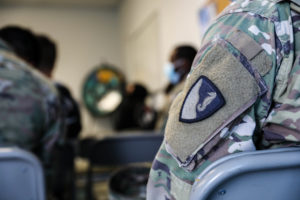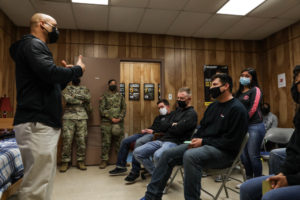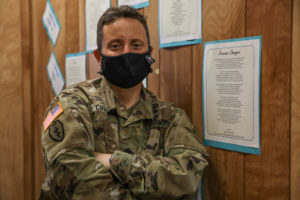FORT HOOD, Texas - Soldiers with the 36th Engineer Brigade at Fort Hood underwent a new sexual assault prevention training course on March 1. The course, called S.W.A.T., which stands for Supporting Warriors Action Team, is a program created in the wake of the ongoing People First Campaign intended to train soldiers to create fundamental change in both command climate and organizational culture at all levels.
“The problem is easy, it’s the solution that’s complex,” said Lt. Col. Angie Chipman, the III Corps SHARP operations director.
“If we were down range this wouldn’t be that hard and I think that’s what’s frustrating for people. The enemy is in the wire and we have to find this person. How do we do it when they look like us, when they are one of us,” Chipman said.
“The key to S.W.A.T. is not the macro, it’s the micro,” said Chipman. “It’s about finding this garbage at the source and stopping it there.”
The three primary objectives of S.W.A.T. are to train soldiers how to recognize signs and early warnings of sexual misconduct, how to intervene in incidents of sexual misconduct and how to advocate for vulnerable servicemembers and the survivors of sexual misconduct.
The training session was divided into two parts: a classroom portion which was conducted in the morning and a hands-on portion in the afternoon.
Chipman, a native of Williamsburg, Iowa, served as the new program’s primary architect and the facilitator for the day’s events. After giving a brief introduction to the course, Chipman handed off the course to the presenters.
“The person who makes the difference is down there in the formation,” said Chipman. “It’s not me. As many speeches as I can give, I’m not the one who’s there on the range, or in the motor pools or at the companies every day.”
The first speaker of the day, Kyomi Carpenter, a victim advocate for 1st Cavalry Brigade presented a lesson on the ‘continuum of harm’ or how events of sexual harassment can escalate into incidents of sexual assault.
“Little comments and individual situations might not seem that bad,” said Carpenter.
“But little things can turn into a bad environment. Find the source and stop it there, because you can’t save everyone on your own,” she said.
Next, Capt. Karolina Przegienda, an Embedded Behavioral Healthcare provider with 3rd Cavalry Regiment on Fort Hood presented a course on bullying and toxic leadership during the morning. The Brooklyn, New York native put an emphasis on establishing a culture of safety and mindfulness in the hope that this could prevent incidents in the future.
“It’s challenging when we start from the ground up,” said Przegienda. “Like anything when you begin at the bottom it takes time, perseverance and motivation. But we need to have these Soldiers invested in themselves and their futures.”
Przegienda went on to say that if Soldiers took away only one piece of her class it was that any voice, no matter the size, can affect change.
“Be that change you want to see, be courageous, stand up for other people,” said Przegienda.
Following Przegienda, Lt. Col. Shaun Lister presented a class on the Uniform Code of Military Justice and legal recourse for violations.
“My hope is twofold,” said Lister. “I hope this class pulls back the curtain a little bit and puts a face to those in the military’s justice system and I hope to show how it all works. Army wide we’re taking steps to improve the situation. Have faith and keep working within the system.”
Training resumed at the SHARP 360 Building where soldiers worked through a number of brief scenarios. The afternoon training saw the Soldiers engaging with the office of the Inspector General, equal opportunity advisors, SHARP representatives and, finally, provided feedback to better the course for future classes.
Sgt. Joya Tardeff, a horizontal construction Noncommissioned Officer with the 62nd Engineer Battalion said that she felt the training had empowered her to help Soldiers in need and provided a wide base of knowledge to assist her in doing so. She also said she was proud of the Soldiers’ efforts throughout the training and appreciated their attentiveness.
“It’s important for them to know you don’t have to be a sergeant to make a difference.” said Tardeff. “A lot of soldiers got this conception, ‘oh I’m just a private, no one would listen to me,’ and that’s just false.”
The Thibodaux, Louisiana native went on to offer encouragement to anyone affected by incidents of misconduct.
“Please, if you’re out there you’re not alone,” said Tardeff.
“You’re not the first. I know it’s hard. There’s people you can trust. We’re out here. Your mental health is everything, find what you need to heal. We’re here to help,” said Tardeff before returning to training.
“The biggest thing I’ll take away from all this is that it’s hard for soldiers going through this,” said Spc. Travis Denny, a combat engineer with the 36th. “I’m glad I know how to handle things like this properly now and what avenues to take because when you see your battle buddy you need to know you can trust them and they’ve got your back.”
“Now that we learned a lot more about how investigations are done and what resources are available,” said Spc. Scott Cokely, a combat engineer with the 36th.“I know that we’re brave enough to stand up and actually confront the situation.”
The 36th Engineer Brigade commander Col. Clete Goetz visited the training and said that he had volunteered the young engineers in his command to be part of the pilot program. He also remarked that he had hope that the soldiers would develop the skills needed to stop sexual assault and harassment at the source.
“I have a real belief in the People First Campaign, so I’m glad I got these guys in here,” said Goetz. “They’re developing these interventional skills that will make the difference in the future.”
“It’s exciting to know that my leadership takes this seriously, that if people are in need we’ll be here to help,” said Cokely. “36 takes this seriously and I can’t wait to take this back to my formation. Stay Rugged!”



-30-
